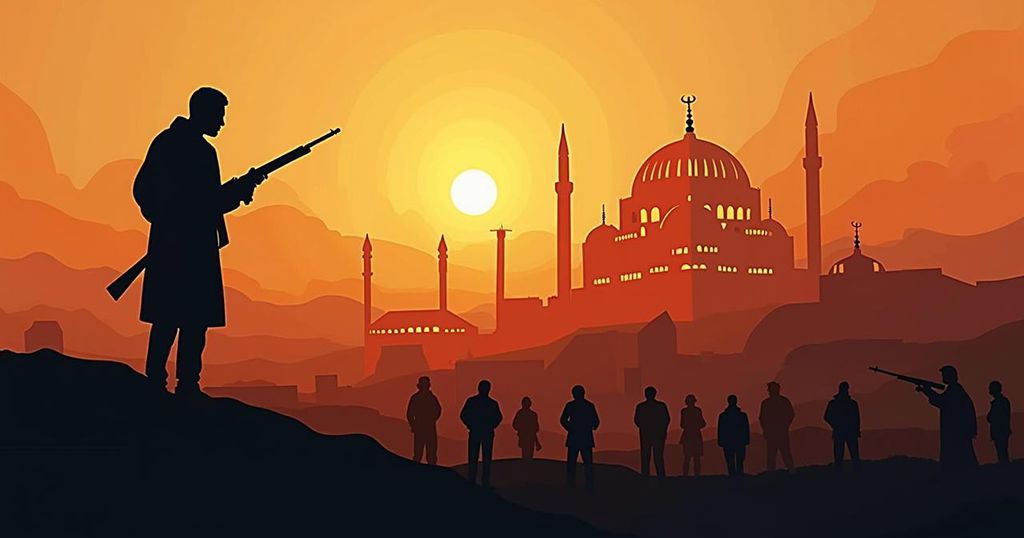The Implications of Hassan Nasrallah’s Assassination for Middle Eastern Dynamics
The assassination of Hezbollah’s leader Hassan Nasrallah by Israel in a coordinated airstrike in Beirut is anticipated to have profound implications for both Hezbollah’s military operations and the overall power dynamics within the Middle East. Nasrallah was a charismatic leader who integralized Hezbollah into a significant political and military force over three decades. His death has prompted escalated military responses and raised concerns for U.S. interests in the region, reflecting the complexities surrounding Lebanese stability and Israeli-Palestinian tensions.
On Friday, Hassan Nasrallah, the notable leader of Hezbollah, was killed in an Israeli attack in Beirut, marking a significant shift in the geopolitical landscape of the Middle East. Nasrallah, whose commanding speeches once resonated broadly throughout the Arab world, transformed Hezbollah from a group of hidden militants into a formidable political entity and military force. This unprecedented assassination may disrupt Hezbollah’s operations and influence across the region, prompting potential retaliatory actions while also drawing in international concerns, particularly from the United States, which has heightened its military presence in response to escalating tensions. The recent Israeli bombings not only claimed Nasrallah’s life but also resulted in the deaths of other senior Hezbollah officials and civilians, representing a critical escalation in hostilities. Firas Maksad, a senior fellow at the Middle East Institute, emphasized that Hezbollah is currently facing a significant crisis following intensive Israeli military actions aimed at dismantling its leadership and capabilities. The organization, which once had an estimated fifty thousand armed members, remains heavily armed and battle-trained, especially from its involvement in the Syrian conflict. As the leader of Hezbollah since 1992, Nasrallah played a crucial role in recruiting support and advocating for armed resistance against perceived threats, primarily Israel. His charismatic leadership allowed him to mobilize Shiite communities, transcending Lebanese borders to connect with Iranian interests and bolstering the so-called Axis of Resistance. The strategic implications of his death are considerable, as it not only undermines Hezbollah’s military hierarchy but may also galvanize response strategies that defy previous limitations. This audacious attack was coordinated at a politically pivotal moment. Israeli Prime Minister Benjamin Netanyahu announced the strikes following a speech at the United Nations, calling Hezbollah a “quintessential terror organization” and justifying the military actions as a necessary response to ongoing cross-border incursions. Despite a recent U.S.-backed effort for a ceasefire, Israel proceeded with the operation, thus complicating diplomatic negotiations and positioning itself sharply against international calls for restraint. The ramifications of these incidents extend beyond immediate military responses, compelling analysts to reconsider Lebanon’s internal stability and Hezbollah’s evolving role. Former Mossad chief Zohar Palti emphasized that the onus is on Lebanon to reestablish control and potentially wrest power from Hezbollah. The Lebanese state’s longstanding weaknesses, coupled with a history of sectarian conflict, raise doubts about its capacity to take effective action in the aftermath of Nasrallah’s assassination. Moreover, the assassination stunned Iran, Hezbollah’s ally, as it reflects a troubling pattern of targeted Israeli operations against significant Iranian military figures in recent months. The Iranian leadership is expected to reevaluate its regional strategy in light of these developments. In response to these events, President Biden labeled Nasrallah’s death as “a measure of justice” for the numerous victims of Hezbollah’s actions and reiterated aims of de-escalating ongoing conflicts in both Gaza and Lebanon, although the likelihood of achieving stability in the region appears uncertain. The assassination not only demonstrates Israel’s willingness to eliminate key adversaries but also questions its long-term strategy in dealing with Hezbollah and the broader geopolitical landscape. The broader implications of this operation will continue to unfold, potentially reshaping alliances and the balance of power in the Middle East.
Hassan Nasrallah’s assassination by Israel reveals the complex dynamics at play in the Middle East, where long-standing tensions between Israel, Hezbollah, and Iran frequently erupt into violence. Nasrallah served as the face of Hezbollah for decades, advocating for militant resistance against Israel and establishing deep ties between Hezbollah and Iran, which provided funding and support. The attack not only raises questions regarding Hezbollah’s future but also complicates U.S. foreign policy, which has sought to stabilize the region while managing the influence of both Hezbollah and Iranian interests. The unpredictability of the aftermath involves potential retaliatory efforts from Hezbollah and its allies, impacting the already fragile political landscapes of Lebanon and the greater Middle East. The assassination underscores escalating concerns for U.S. military personnel and interests in the area, prompting an increased military readiness among American forces.
The assassination of Hassan Nasrallah marks a pivotal moment in Middle Eastern geopolitics, signaling a significant blow to Hezbollah’s command structure while posing challenges for both Lebanon’s stability and U.S. foreign policy. As Hezbollah grapples with leadership vacuums and potential retaliatory pressures, the resulting reactions will not only redefine its operational capabilities but may also lead to broader ramifications throughout the region. The concerted military actions by Israel, coupled with geopolitical shifts involving Iran, push all parties toward an uncertain future loaded with potential conflicts. The international community’s response will be critical in determining whether the situation escalates further or whether diplomatic solutions can be found to address rising tensions.
Original Source: www.newyorker.com




Post Comment